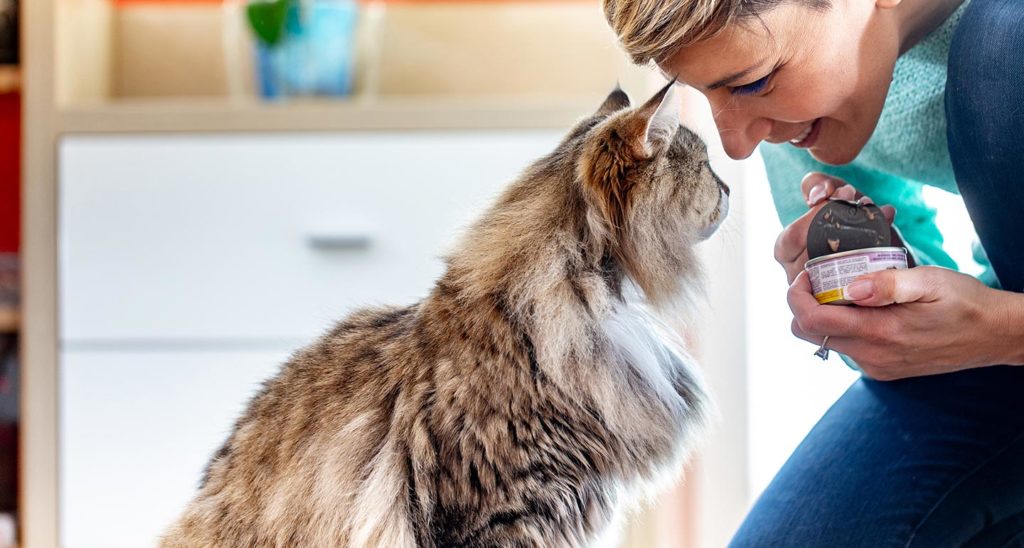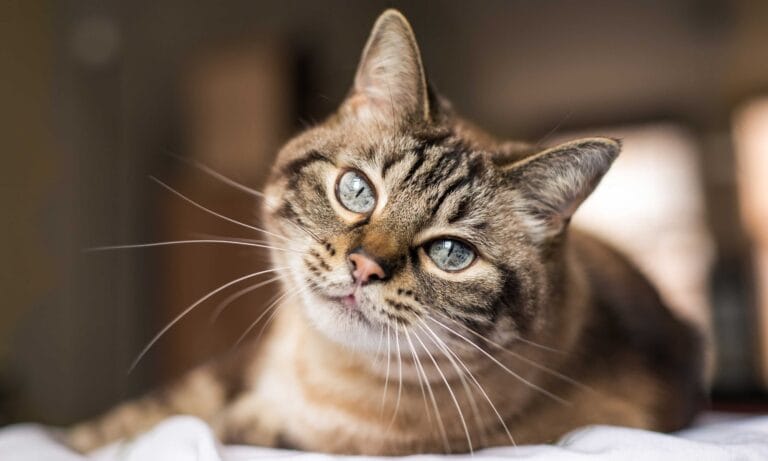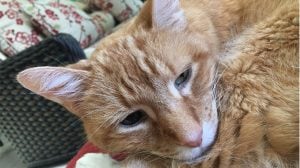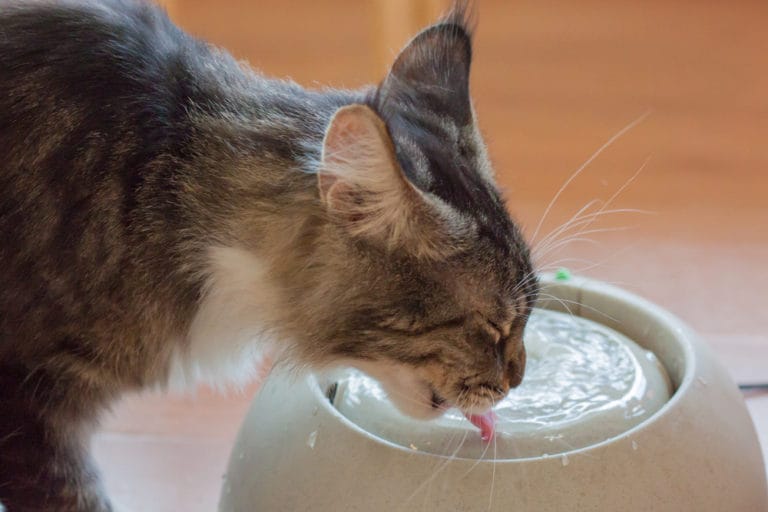Hootie, a 15-year-old shelter cat living in Salt Lake City, Utah, faced a tough road to adoption. Not only was he surrounded by younger, cuter cats, but the poor little guy looked sickly and unwell. His coat lacked luster, and he had no energy to greet prospective adopters. But thanks to veterinary care from Best Friends Animal Sanctuary—and the best senior cat food to meet his special needs—that road to adoption became a lot easier.
After moving from a city shelter to Best Friends, Hootie was diagnosed with age-related kidney disease and immediately was put on extra fluids and a diet to help manage his illness. He started to feel and look better. And when foster mom Amy Rohman Needham brought Hootie home to recuperate, his personality blossomed.
“He came with a lot of burps and sneezes, but he was just the sweetest guy,” she says.
With his kidney disease managed on the special diet, Hootie’s heath continued to improve, so he returned to Best Friends to find a forever home. That’s when Kelly Smith fell in love. With open arms, the graduate student and animal lover welcomed Hootie into her family, which included another rescued cat named Bonnie.
“Hootie and Bonnie love me just because I exist, and they are happy to see me regardless of how my day went,” Smith says. “It’s made my life so much better. I can’t believe I got so lucky.”
No doubt Hootie feels the same way. His special diet made a big difference in his life—the difference between life and death. Senior cats like him often have special dietary needs. If your feline friend is one of them, read on to learn all about what to look for when selecting the best senior cat food for your older cat, and how you can make their golden years the best they can be.
Nutritional Requirements for Adult Cats
Before we explore the best senior cat food options for more mature felines like Hootie, let’s first take a look at the specific dietary requirements for adult cats. Andrea Fascetti, Ph.D., VMD, a veterinary nutritionist and professor at UC Davis School of Veterinary Medicine in California, says that compared to other mammals, cats have some unique nutrition requirements.
“Scientific research has shown that cats have obligatory requirements for nutrients that are not essential for many other mammals,” she says.
Turns out our feline friends have good reason to be finicky.
No matter their age, cats require protein, fat, minerals, vitamins and water—but they require some very specific amino acids and vitamins, according to the National Research Council Committee on Animal Nutrition (NRC). Here’s what they recommend for each nutrient:
- Proteins and Amino Acids: Because cats are carnivorous animals, they should derive most of their protein from meat, fish and other animal products. Dietary protein contains 10 specific amino acids, including arginine and taurine, all of which cats require but can’t make on their own. The NRC recommends an adult cat’s diet contain at least 12.5 grams of crude protein (for an adult cat weighing 9 pounds and consuming 250 calories).
- Fats and Fatty Acids: Dietary fats are also a must for cats. They’re derived from animal fats and seed oils, and they supply essential fatty acids that cats require but can’t make on their own. Fats serve as carriers for fat-soluble vitamins, play a role in cell structure and function, keep your cat’s skin and coat healthy, and make food taste good. The NRC recommends an adult cat’s diet contain at least 5.5 grams of total fat. (Again, for an adult cat weighing 9 pounds and consuming 250 calories.)
- Carbohydrates and Fiber: Carbs, such as cereals, legumes and other plant foods, aren’t essential in a cat’s diet, but they do provide an abundant source of energy, which they use to sustain the normal activities of the daily lives.
- Vitamins: Vitamins in your cat’s food include vitamin A, D, E, K, B1, B6, B12, riboflavin, niacin, pantothenic acid and folic acid. These organic compounds take part in a wide range of metabolic activities. It’s also vital to note that some vitamins are not only essential in small doses, but are also toxic in large amounts, according to the NRC.
- Minerals: Cats require 12 minerals in their diets, too: calcium, phosphorus, magnesium, sodium, potassium, chlorine, iron, copper, zinc, manganese, selenium and iodine. Pet food manufacturers typically add a vitamin-mineral mix into their formulas to ensure the diets contains the correct amounts of each ingredient.
- Water: Though they have a weak thirst drive, cats also require free access to fresh, clean water, according to the NRC. They typically drink 2 milliliters of water for every gram of dry food they eat.
When it comes to selecting a particular diet, Dr. Fascetti says that quality does differ across various brands, but a consultation with your veterinarian can help you choose the right one for your individual cat.
“The vet knows you, knows your situation, and will be able to help you pick a diet that’s right for you,” she says. “There are certainly good products at every level—grocery store, pet store, veterinary office—that can be used to healthily support a cat’s dietary needs. There’s no reason why somebody shouldn’t be able to find a good quality cat food.”
Understanding Cat Food Labels
Now that we understand the basic nutrient requirements of an adult cat, let’s take a look at the basic guidelines for cat food and who regulates them.
In the United States, pet foods are overseen by the U.S. Food and Drug Administration’s Center for Veterinary Medicine, notes Dr. Fascetti. They rely on the NRC’s expertise for information about specifically what pet foods should contain to ensure their safety and efficacy.
The FDA requires that pet food manufacturers include certain information on their labels, including proper listing of ingredients and the manufacturer’s name and address. Some states have adopted more specific regulations established by the Association of American Feed Control Officials (AAFCO). Those include feeding instructions, guaranteed analysis and a nutritional adequacy statement. Let’s look more closely at each of these:
- Feeding Instructions: The feeding instructions give guidelines for how much to feed your cat based on their weight. Sometimes they will include information about when and how often you should feed your cat.
- Guaranteed Analysis: The guaranteed analysis breaks down by percentage what nutrients are in the food. It lists minimum levels of crude protein and crude fat, and maximum levels of crude fiber and moisture. It usually includes percentages or measurements of additives, vitamins and minerals, as well.
- Ingredients: The ingredients, or the carriers of the nutrients, are listed in descending order by weight. Often, a form of protein appears first in line, followed by grains, fats, additives and preservatives.
- Nutritional Adequacy Statement: The nutritional adequacy statement says whether the food provides complete and balanced nutrition for a cat based on nutritional levels established by AAFCO. The statement also provides a life-stage claim, which states the life stage (growth/lactation, adult maintenance or all life stages) for which the food is intended.
-
AAFCO has developed two nutrient profiles for cats: growth/lactation and adult maintenance. All foods must meet at least one of these profiles. Some labels claim the food is intended for all life stages. Those foods provide enough nutrients for an animal’s growth and reproduction, as well as for maintaining a healthy adult—which includes senior and geriatric cats.
-
- Manufacturer’s Contact Information: A name and address of the manufacturer, packer or distributor are required; sometimes manufacturers include a toll-free phone number or website address, but these aren’t mandatory.
What Is “Senior” Cat Food?
Because AAFCO’s nutrient profiles don’t distinguish between “adult” and “senior,” it turns out that senior diets are not all that different from everyday adult cat food, says Joseph Bartges, DVM, Ph.D., DACVIM, DACVN, a professor of medicine and nutrition in the department of small animal medicine and surgery at the University of Georgia College of Veterinary Medicine in Athens, Georgia.
“There is no AAFCO designation for a ‘senior’ diet, nor is there a nutrient profile for a senior cat,” he says. “Therefore, ‘senior’ diets are essentially slightly modified adult foods.”
Historically, senior foods were lower in protein and fat and higher in fiber, Dr. Bartges says, but that’s not necessarily true anymore.
“Whether a cat needs these dietary modifications is really cat dependent,” he says.
When to Switch to Senior Cat Food
So, is there a definitive age at which a cat should switch to a “senior diet?” Unfortunately, no, Dr. Bartges says. It all depends on the individual cat and their veterinarian’s recommendations.
“If an older cat is maintaining body weight and muscle condition on a certain diet, then there is no reason to change it,” he says. “If they are gaining weight for no particular health reason other than a change in metabolism, then feeding a ‘senior’ type of diet or a lower energy and higher fiber diet may be [recommended]. If they are losing weight for no apparent health reason other than a change in metabolism, then a diet change to something more calorically dense, such as kitten food, could be indicated.”
And, of course, if a cat develops a health issue—like diabetes or a chronic kidney disease like Hootie—a diet switch may be warranted to help manage the issue, he says.
“Owners should discuss diet with their veterinarian at all visits regardless of age,” Dr. Bartges says. “For a diet change—whether to a senior diet or not—it comes down to their historical information, and the results of a physical examination and laboratory evaluation.”
When it’s time to switch, it should be done over several days, he adds.
“In general, transitioning over [several] days should be done to ensure the cat accepts the new food,” Dr. Bartges says, also noting that it can take up to weeks or months for the cat to accept the new food when a disease, such as chronic kidney disease, is present.
Get tips for transitioning your cat to a new food.
Other Senior Cat Food Factors to Consider
When choosing a food for your senior cat, Dr. Fascetti says your main goals should be:
- Maintaining their health and ideal body weight
- Slowing or preventing chronic illness
- Lessening the symptoms of any pre-existing illnesses
But other things matter, too, like the food’s taste, texture and moisture content, according to “Nutrient Requirements of Dogs and Cats” by the National Research Council. In fact, the report says, cats will choose foods based on these features rather than nutritional adequacy. Let’s look more closely at these features.
Taste and Smell
As cats get older, taste becomes increasingly important as their senses start to wane, Dr. Fascetti says. Wet foods, she says, tend to rate higher on the palatability scale.
“Cats are funny—some cats will only eat dry food, and some will only eat wet food,” Dr. Fascetti says. “Each cat is different, but it seems like, overall, palatability tends to be a little higher on wet food for cats.”
Many of their preferences develop in their younger years. “Cats are creatures of habit, and if they have been eating dry food all of their lives, they may not accept a change to a canned food,” Dr. Bartges says. “One way to avoid this is to provide variety starting at a young age—not only with dry and canned but different flavors and different companies.”
Texture
The food’s texture makes a difference as well. Senior cats with missing teeth may prefer wet food or kibble softened with some warm water, but some can still gum the crunchy stuff.
“With missing teeth, many cats can still eat dry food as their gums become harder and they often still have other teeth to crush dry kibble,” Dr. Bartges says.
Moisture Content
Food with a higher moisture content tends to be more palatable to cats, too. As carnivores that eat prey in the wild, they prefer a diet that mimics freshly caught prey, which tends to be, well, moist.
“Cats are true carnivores and eat prey in the wild; therefore, feeding a diet that mimics as close as possible helps,” Dr. Bartges says. “These are higher protein, low carbohydrate, moist foods.”
Wet or moistened food also has a higher water content, says Dr. Fascetti, which is good for cats with urinary tract issues.
“For animals who have or may be predisposed to having urinary tract problems, that increase in water intake and encouraging more frequent urination may help with problems like feline urologic syndrome [or Feline Lower Urinary Tract Disease],” Dr. Fascetti says.
Finding a food with the right taste, texture and water content—not to mention all the right nutrients—can be a challenge, especially when you have a picky senior cat. Working with your veterinarian is your best bet.
“If an older cat is finicky, the question to answer first is whether this is due to a health issue or not, which requires a veterinary examination and laboratory evaluation, as older cats are prone to diseases associated with aging,” Dr. Bartges says.
Dr. Fascetti agrees. “The first step is to contact your veterinarian,” she says. “Because we certainly don’t want somebody overlooking a problem, thinking it’s just the animal being finicky, when in fact there’s a real underlying problem that needs to be addressed.”
Senior Cat Foods for Common Issues
Speaking of underlying problems, senior cats can develop some common health issues that may be managed with diet. Of course, before you change your pal’s diet, talk to your veterinarian about the root cause of their health issues.
Muscle Loss
If your feline is losing muscle, it might be time to switch to a higher-protein diet, Dr. Bartges says.
“Sometimes [losing muscle mass] is due to disease such as chronic kidney disease, hyperthyroidism or diabetes mellitus. Sometimes it is due to diet if the diet was changed to a lower protein diet. If there is no disease present, then feeding a higher protein and lower carbohydrate diet may help,” Dr. Bartges says.
Weight Gain
For overweight senior cats who need to drop a few pounds, pet parents have a couple of options, Dr. Bartges says, and if one doesn’t work, you can try the other.
“Conventionally and historically, a high fiber, low fat, low calorie diet was used to induce an energy deficiency and promote fat mobilization and weight loss,” Dr. Bartges says. “More recently, many have gone to a high protein, low carbohydrate diet (a so-called metabolic shift diet), which is similar to eating prey—although not exactly.”
Behavioral/Memory Changes
If your senior cat is having trouble remembering things—such as where their litter box is, how to eat or drink or how to play with their favorite interactive toy—or displaying senile-like behaviors like staring into space, altered sleep/wake cycles, meowing loudly (especially at night), or spatial disorientation, you could choose a diet with antioxidants and healthy fats.
“Theoretically, antioxidants, lipoic acid and possibly omega-3 fatty acids may help,” Dr. Bartges says.
Eating and Drinking Less
Sometimes not eating or drinking enough can be a problem for older cats. First rule out any medical issue, and then get creative in the kitchen.
“As with other issues, the first thing to check is whether there is a disease present or not, especially in an older cat,” Dr. Bartges says. “[Certain diseases], such as chronic kidney disease or hyperthyroidism, can be found on blood work. But … primary GI disease, such as chronic enteropathy or intestinal cancer, will not show up on blood work and requires imaging, such as ultrasound, to evaluate.”
If nothing is medically wrong, Dr. Bartges suggests warming up the food or offering several different foods to determine what flavor and texture the cat prefers.
“Warming food to near but not above body temperature helps,” Dr. Bartges says. “Trying a smorgasbord of foods to find what he/she will eat may also help.”
The Best Senior Cat Foods
With myriad senior cat foods available on the market today, it’s tough to choose the best one for your feline friend. Should you get one with higher protein? Grain-free? Lower calories? What about all those antioxidants? Is there a best dry food for senior cats, or a preferred moist paté? It really is hard to pick the perfect diet!
To make your decision easier, we first recommend you talk to your veterinarian for guidance on what type of food is best for your senior cat and their particular needs. Then, with your choices narrowed down a bit, check out some of options that we’ve listed below.
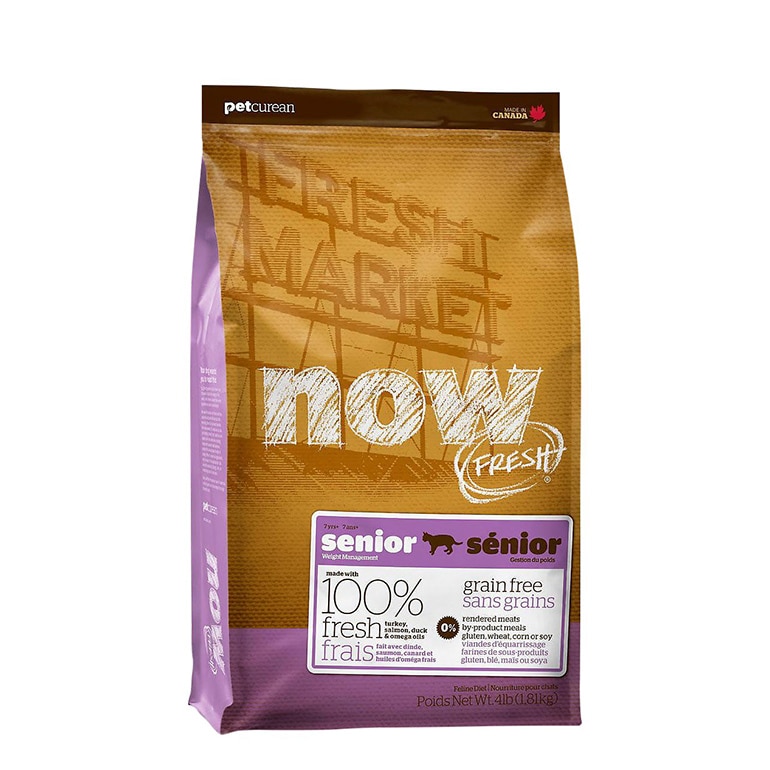
Photo: Chewy.com
1
Now Fresh Grain-Free Senior Weight Management Recipe Dry Cat Food
If your senior cat needs to drop a few pounds, this protein-packed dry food could help. Formulated with turkey, egg, salmon and duck, the zero-grain formula adds pea fiber along with a cornucopia of vegetables and fruits, like spinach, cranberries, blackberries, pumpkin, lentils and carrots. The recipe also contains the necessary vitamins, minerals and amino acids cats need in their diets, along with omega-3 and omega-6 fatty acids for a soft and shiny coat. And to help with digestion and nutrient absorption, the food also has added prebiotics and probiotics.
Find it here: Now Fresh Grain-Free Senior Weight Management Recipe Dry Cat Food
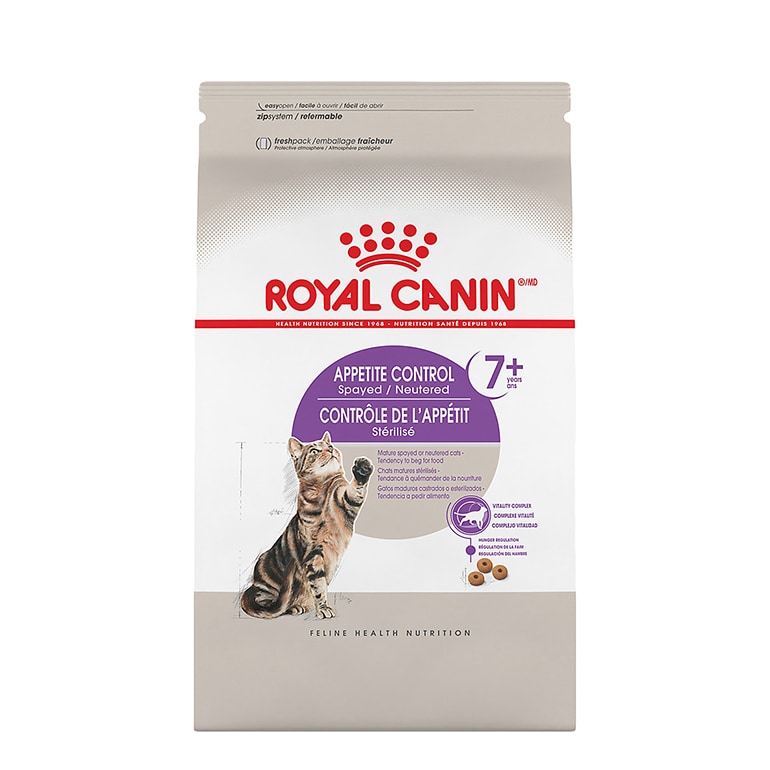
Photo: Chewy.com
2
Royal Canin Appetite Control Spayed/Neutered 7+ Dry Cat Food
If your senior cat is spayed or neutered, that could mean they’re more likely to put on weight. This diet, formulated especially for cats that have been neutered, helps control appetite by increasing fiber intake. It’s made with protein-rich chicken, along with corn, wheat, pea fiber and beet pulp, along with a healthy blend of vitamins, minerals and amino acids. The recipe includes antioxidants like green tea, marigold and rosemary extract, too, for a healthy immune system. Adapted phosphorous levels also help to support renal function.
Find it here: Royal Canin Appetite Control Spayed/Neutered 7+ Dry Cat Food
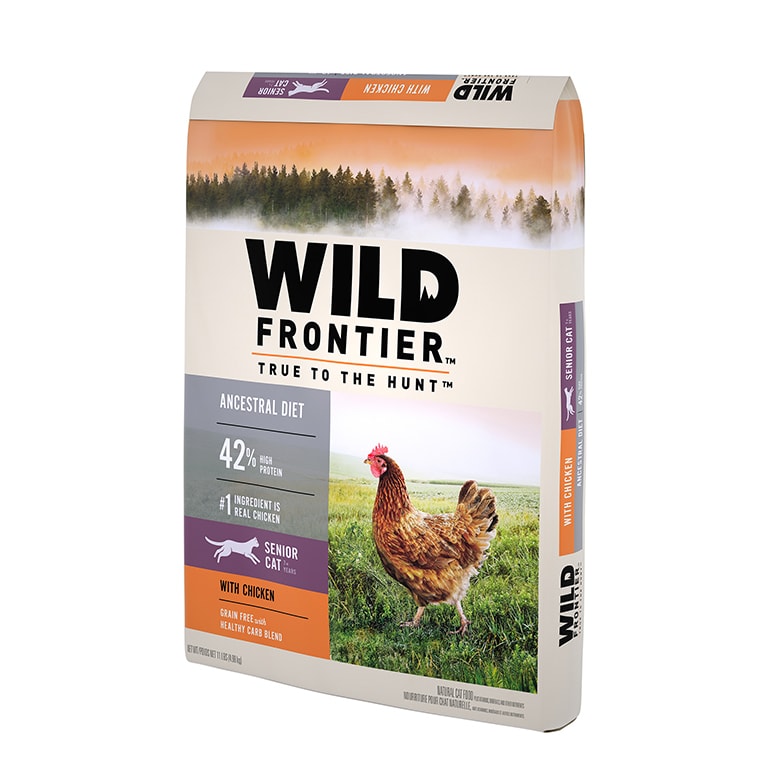
Photo: Chewy.com
3
Wild Frontier Senior Open Valley Recipe Chicken Flavor High-Protein Grain-Free Dry Cat Food
Specially formulated to support heart and joint health, this senior cat diet features high-quality chicken as its main protein source, along with pea protein, potato protein and salmon meal. The low-carbohydrate recipe also includes split peas, beet pulp, tapioca, lentils and flaxseed for fiber and nutrients, with a mix of essential vitamins, minerals and amino acids. It contains antioxidants, like rosemary, yucca and zinc, for a healthy immune system, along with calcium and vitamin D for strong bones.
Find it here: Wild Frontier Senior Open Valley Recipe Chicken Flavor High-Protein Grain-Free Dry Cat Food
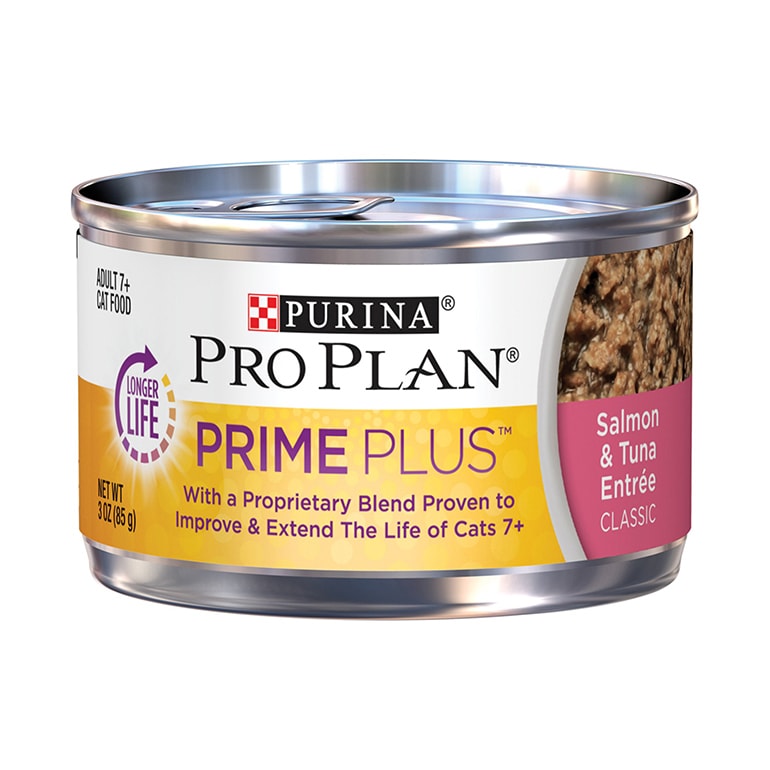
Photo: Chewy.com
4
Purina Pro Plan Prime Plus Adult 7+ Salmon & Tuna Entree Classic Canned Cat Food
On the hunt for the best wet food for senior cats? This diet features salmon and tuna in its recipe, along with a blend of vitamins, minerals, healthy omega-3 and omega-6 fats, and fiber-rich chicory root to aid in digestion. The antioxidant-packed meal is designed to support a strong immune system and maintain a lean body mass. Plus, it contains a higher moisture content than dry food, giving your cat the extra water they need.
Find it here: Purina Pro Plan Prime Plus Adult 7+ Salmon & Tuna Entree Classic Canned Cat Food
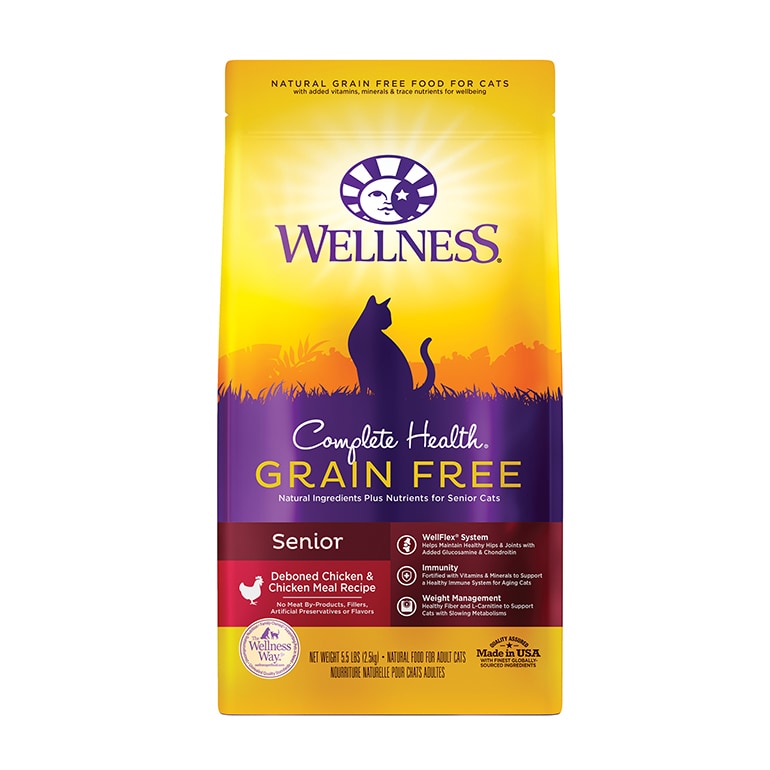
Photo: Chewy.com
5
Wellness Complete Health Chicken & Deboned Chicken Grain-Free Senior Dry Cat Food
For healthy joints and a strong immune system, this senior cat food includes glucosamine hydrochloride and chondroitin sulfate, along with antioxidants like zinc, yucca, rosemary, kelp and green tea extract. It features deboned chicken as its main protein source, along with potatoes, lentils, tomato pomace, flaxseed, chicory root extract and cranberries for energy and metabolism-boosting fiber. The diet also contains the necessary vitamins, minerals and amino acids cats need in their diets, along with probiotics to aid in digestion.
Find it here: Wellness Complete Health Chicken & Deboned Chicken Grain-Free Senior Dry Cat Food
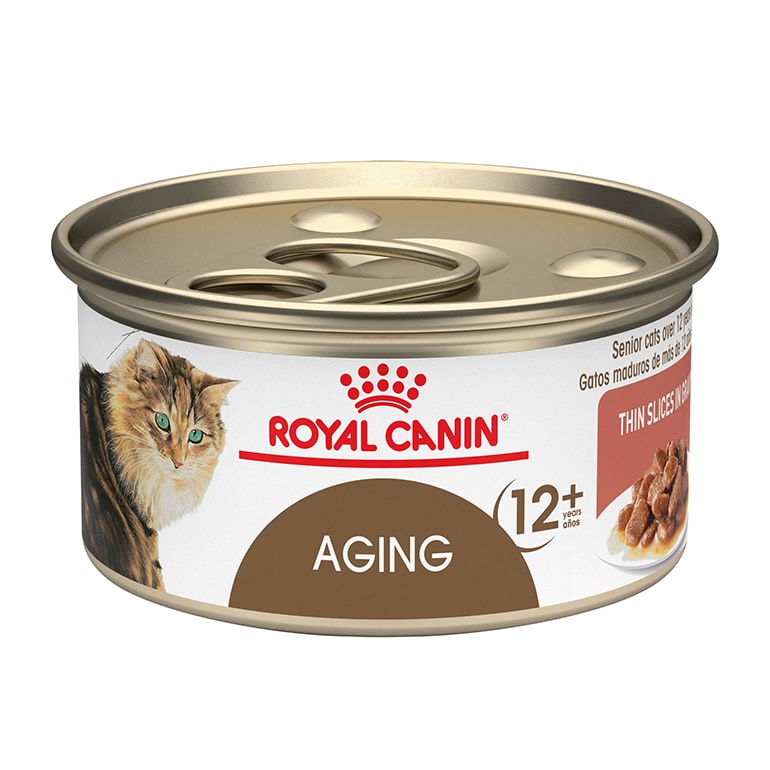
Photo: Chewy.com
6
Royal Canin Aging 12+ Thin Slices in Gravy Canned Cat Food
Formulated especially for older senior cats 12 years old and up, this wet diet is designed to provide a balance of protein, fat and carbohydrates. It contains a blend of healthy fats and glucosamine to support joint health, along with vitamins and minerals, antioxidants and reduced phosphorous to help support kidney health. The chunky slices in gravy make it easier for older cats with sensitive teeth and gums to eat. Serve it mixed with crunchy kibble or serve it alone.
Find it here: Royal Canin Aging 12+ Thin Slices in Gravy Canned Cat Food
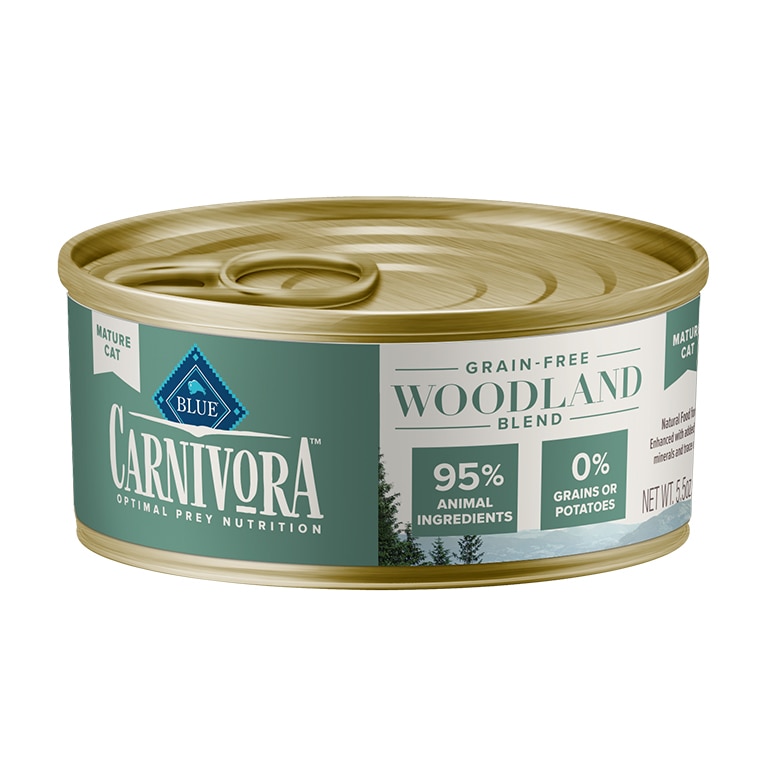
Photo: Chewy.com
7
Blue Buffalo Carnivora Woodland Blend Grain-Free Mature Wet Cat Food
Featuring protein from 11 different animal sources, this high-protein senior cat diet is designed to mimic what your cat would eat in nature. It has fresh, raw and dried chicken, turkey, saltwater fish and duck—including organ meat and cartilage. Pea fiber, along with pumpkin and carrots give the diet fiber, and a mix of vitamins and minerals provide the additional nutrients the senior cat needs to thrive. The wet, paté-style texture also gives your cat plenty of moisture, and it’s free from grains and potato.
Find it here: Blue Buffalo Carnivora Woodland Blend Grain-Free Mature Wet Cat Food
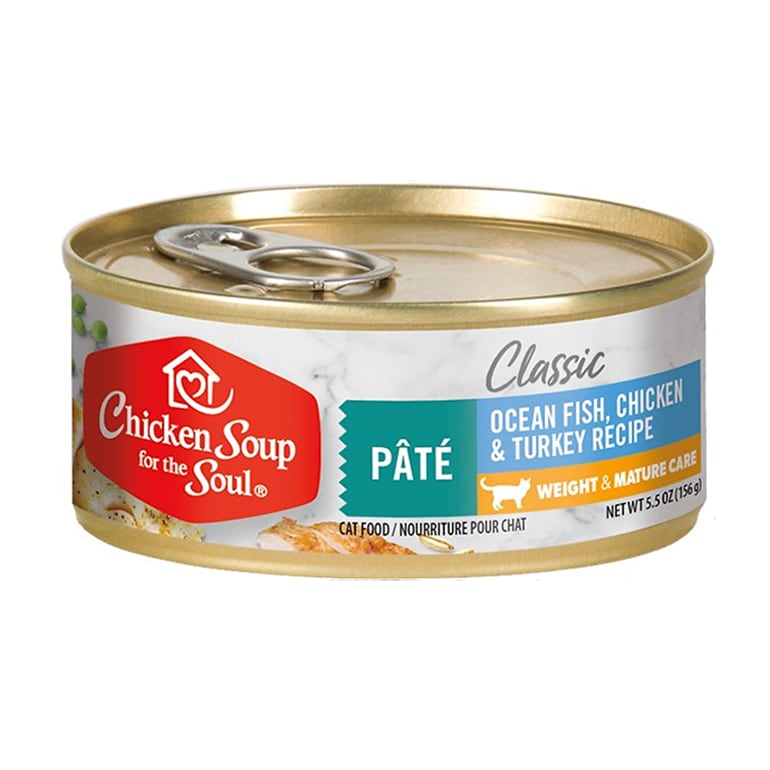
Photo: Chewy.com
8
Chicken Soup for the Soul Weight & Mature Care Ocean Fish, Chicken & Turkey Recipe Pate Canned Cat Food
This wheat-, corn- and soy-free diet has fewer calories for senior cats who may need to lose some extra weight. Protein sources include saltwater fish, turkey, duck, chicken and chicken liver, along with chicken and turkey broth for moisture. It also includes brown rice, oatmeal and pea fiber, with carrots, peas, apples and cranberries for plant-based nutrients. The recipe includes healthy fats for aging brains, and a mix of vitamins, minerals and antioxidants for overall health.
Find it here: Chicken Soup for the Soul Weight & Mature Care Ocean Fish, Chicken & Turkey Recipe Pate Canned Cat Food
What Not to Feed Senior Cats
Because of possible stomach upset or toxic reactions, senior cats—not to mention adults and kittens, too—should not eat certain human foods, Dr. Fascetti says. Below, we’ve included a list of foods that should be avoided:
- Alcohol: Can cause vomiting, diarrhea, decreased coordination, central nervous system depression, difficulty breathing, tremors, abnormal blood acidity, coma and even death
- Avocado: Can cause stomach irritation
- Chocolate, Coffee and Caffeine: Caffeine-like compounds called methylxanthines can cause vomiting, diarrhea, panting, excessive thirst and urination, hyperactivity, abnormal heart rhythm, tremors, seizures and death.
- Citrus: Can cause stomach irritation
- Coconut Milk and Fresh Coconut: Can cause stomach irritation, loose stools or diarrhea
- Garlic, in large enough amounts: Can cause stomach irritation, vomiting, diarrhea, heart palpitations, tremors, seizures and death
- Grapes and Raisins: Can cause kidney failure
- Onions: Can cause stomach irritation
- Macadamia Nuts: Can cause stomach upset, weakness and temporary paralysis
- Nuts: Can cause vomiting and diarrhea
- Xylitol and Other Artificial Sweeteners: Can send an animal into a hyperglycemic state and cause coma
If your pet has ingested something that’s making them sick, call the ASPCA’s Animal Poison Control Center at 888-426-4435 for assistance or visit the ASPCA’s Animal Poison Control Center’s website for information.
Individual Cats, Individual Needs
We all want our cats to live their best nine lives for as long as they can, right? Well, with the right diet, we can supply all they need nutritionally so they’ll remain happy and healthy well into their golden years.
Hootie is a testament to how proper diet can make a difference to both a senior cat and kitties of all ages. With the right food, he was able to manage his kidney disease—and ultimately find a forever home.
Read more:
- 9 Senior Cats and Dogs Living Their Best Life
- Solving Litter Box Problems in Senior Cats
- 13 Cool Pet Gadgets to Help Your Senior Dog or Cat
Want to give your pet superior health and nutrition? Chewy offers a variety of premium cat food so you can feed your feline the highest quality ingredients. Shop Chewy's selection of premium cat food here.
Share:
